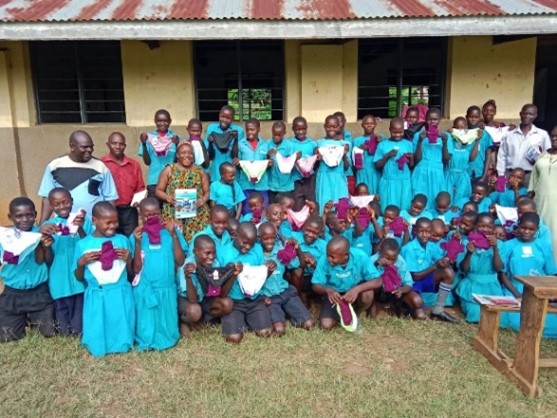Changing the Face of Menstrual Hygiene Management in Schools in Luuka and Kamwenge Districts
Puberty and the menstrual cycle mark significant and natural phases in the lives of women and girls which signify growth and development, yet often bring about anxiety and discrimination. Menstrual health is directly linked to the fulfillment of human rights, specifically reproductive rights, and is an integral component of achieving the Sustainable Development Goals (SDGs).
According to a guidance report by UNICEF, People who menstruate may miss school or work, or struggle to participate and benefit fully in educational activities (SDG 4)[1]. This is one of the prevalent issues among girls once they begin menstruating. This is primarily due to challenges such as a lack of access to sanitary pads, inadequate water supply, and absence of separate toilet facilities for girls in many primary schools, and the stigma perpetuated by fellow students.
As such, Water For People has taken the initiative to transform Menstrual Hygiene Management (MHM) in schools in Luuka and Kamwenge Districts. Water For People has supported over 60 schools that were faced with challenges of poor sanitation facilities and limited access to hygiene and hand washing facilities. This has been through the construction of 5-stance latrine blocks with a washroom and an incinerator for menstrual hygiene for the girls, a urinal for boys, as well as a WASHaLOT for mass/group hand washing.
For proper disposal of menstrual hygiene waste which emerged as a critical concern within MHM, menstrual hygiene incinerators were constructed which are incorporated into girls’ sanitation facilities and are linked to changing/bathrooms, enabling girls to conveniently dispose of menstrual hygiene waste through a chute into the incinerator.
Currently, a total of 33 schools in Kamwenge and 7 schools in Luuka have benefited from the installation of menstrual incinerators, enhancing proper disposal and management of menstrual hygiene waste.


For the sustainable management of the facilities and sustaining behavioral change in the target schools, there was a need for extensive awareness campaigns and trainings to promote a better understanding of MHM and overall water, sanitation, and hygiene (WASH) practices.
Through collaborations among Water For People staff, local government, district education offices, schools, and stakeholders, coordination was established to facilitate MHM training and capacity building of Parent Teacher Associations and School Management Committees.
MHM training sessions were conducted across various schools for both boys and girls with the aim of identifying issues related to the neglect of adolescent girls’ needs and collaboratively finding solutions.


Teachers, parents, and pupils during trainings to bring more awareness to MHM and WASH as a whole.
The training session activities included:
- Training boys and girls on the concept of MHM, making reusable sanitary pads, and proper disposal of menstrual hygiene waste.
- Establishment of sanitation clubs which consisted of both girls and boys. The clubs oversaw the schools’ general sanitation and hygiene, child-to-child WASH management promotion on a day-to-day basis, empowering other students and pupils in WASH matters, and ensuring the promotion of Menstrual Hygiene Health for the girls without any bias and stigma.
To disseminate the acquired knowledge from these training sessions, schools implemented activities such as music, dance, and drama (songs, poems, raps, and dances) that were presented to fellow pupils, teachers, and parents.
This was also a way of building the capacity of school children and teachers to use music, dance, and drama in promotion of WASH in schools.
The capacity building of the School Management Committees (SMCs) and Parents Teachers Associations (PTAs) aimed at bringing forth prevailing WASH issues and finding sustainable related solutions. This also included appreciating, planning for implementation, and monitoring of WASH initiatives aimed at proper operation and maintenance.
Water For People’s efforts in transforming MHM practices and providing necessary infrastructure demonstrates a commitment to addressing the challenges faced by girls in Luuka and Kamwenge Districts. By promoting awareness, education, and improved sanitation facilities, a significant step has been taken towards empowering girls to manage their menstrual hygiene effectively and ensuring their continued education.
[1] UNICEF, Guidance on Menstrual Health and Hygiene, UNICEF, New York, 2019.
